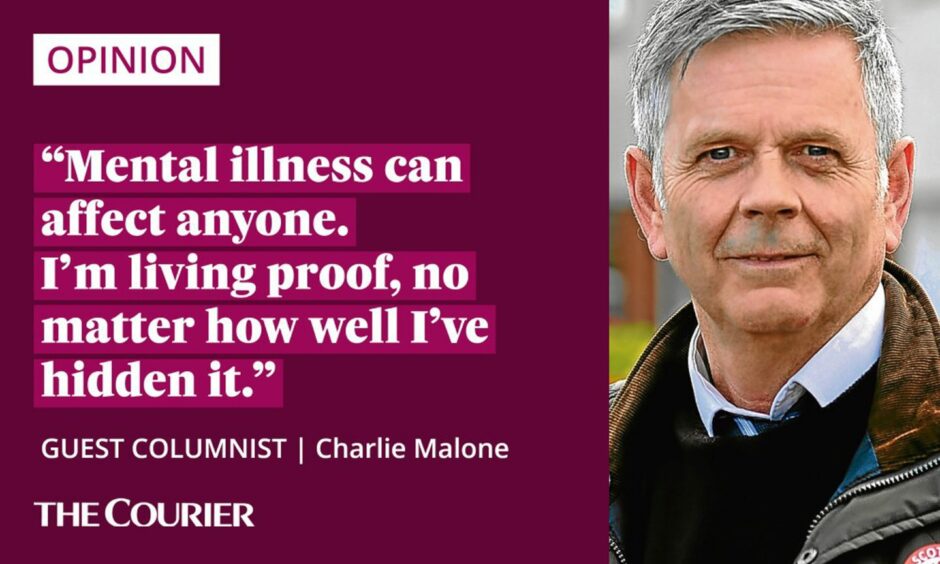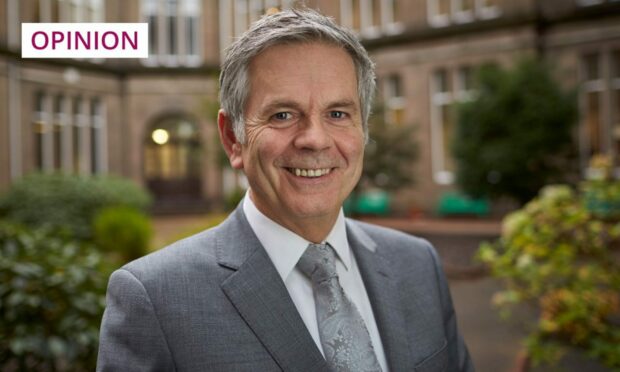Talking about your own mental health is not easy. In fact, when you are suffering from a condition such as anxiety or depression, talking about your problems can seem like the most difficult thing in the world.
Yet, if you are suffering from poor mental health, you are encouraged to “open up” and talk to others.
Talking about your problems is widely regarded as being the first step to recovery.
So what is stopping us?
For me, my job as a senior lecturer at Abertay University has made talking about my mental health just that little bit harder.
Not because I think I would not be supported by the university or colleagues. But because I’m in a position where I need to project competence and authority on a daily basis.

Opening up to my students and being vulnerable is not something that is in the job description.
However, now I’m approaching the end of my career, I feel it’s time to start talking about my struggles with my mental health.
That’s why, after some encouragement and persuasion from a colleague, I decided to accept an offer to host an online talk about my experience to mark Mental Health Awareness Week 2022 at Abertay.
Conversation around mental health was never taboo in my home
Talking about my problems in such a public way is a daunting prospect.
However, I hope that by speaking out, I might encourage other people who are suffering to start talking about their own struggles and seek help.
As with most stories, my own starts with my childhood.
Both my parents were psychiatric nurses and mental health was frequently a topic of conversation at the dinner table.
From a young age, I had a good knowledge of mental health disorders and what would happen if you didn’t take care of yourself.
At weekends I volunteered at the psychiatric hospital my parents worked at. So you could argue that I was exposed to the perils of ill mental health very early on.
In my home, there definitely wasn’t that stigma around mental health that you hear about elsewhere.
Some might say that then begs the question: if my family were so open about mental health, why have I struggled with it for most of my life?
To answer that, I should first explain a bit about my condition.
Let’s talk about my mental health
I was first diagnosed with generalised anxiety disorder, or GAD, when I was 21.
GAD manifests as excessive and exaggerated worry about everyday life events.
It’s a tendency to catastrophise absolutely everything for no obvious reason.
If you’re experiencing depression it can be hard to find the energy to look after yourself. But taking taking steps to help yourself cope with your experiences can make a big difference to how you feel.
Find out more: https://t.co/WH2rEnMavd | #MentalHealthAwarenessWeek pic.twitter.com/PhgTZqUW0r
— SAMH (@SAMHtweets) May 10, 2022
Part of my illness also involves an overbearing sense of failure which sees me constantly pushing myself to do more, to work harder, to be better.
I think this is the main reason why I’ve always been reluctant to talk about my own mental health – the perceived sense of failure that comes from admitting that something is wrong, and you need help.
As well as GAD I’ve had brushes with PTSD (following a life-threatening illness a few years ago) and depression.
I’ve never really spoken openly about these illnesses, not even to professionals.
Work has been my escape
One thing that has helped manage my condition (though not something I’d recommend to others) is throwing myself into my work.
All my adult life I’ve been a workaholic. And I think some people thought this was driven by ambition or a desire to be successful.
The truth is, my addiction to my work is borne out of an intrinsic need to keep busy and concentrate on absolutely anything other than myself or my problems.
Fast forward to 2017 and that desire to focus on others is what led me to get involved in local politics and stand for election to Dundee City Council.
Being a councillor is the perfect job for someone like me. As soon as you’ve sorted one problem for a constituent, another one comes in.
Politicians, particularly at a national level, often say that being involved in politics and all that comes with the job has a detrimental effect on their mental health. But for me the reverse is true.
I think that if I didn’t have two high-pressured, demanding jobs then my mental health would be far worse.
For as long as I can remember I’ve always been interested in politics. But it was the 1993 Timex industrial dispute that really politicised me.
I was a shop steward at Timex for a number of years and was latterly chair of the strike committee during the dispute.
It was a really tough time for the workers. And I credit that dispute with igniting in me a need to help others.
Poor mental health can affect us all – it’s time to have that conversation
I hope that by opening up about my own experience it demonstrates that mental illness doesn’t discriminate.
It doesn’t matter if you have a successful career, a loving family, money in the bank. Mental illness can affect anyone.
I’m living proof, no matter how well I’ve hidden it.
Now that I’m coming to the final chapter in my career, there is the temptation to let the mask slip, to show the world the ‘real’ Charlie, warts and all.
If doing so helps demonstrate the importance of talking about mental illness, then I’ll consider that a job well done.
Charlie Malone is a Dundee City councillor and a senior lecturer at Abertay University. The university is running a programme of events for Mental Health Awareness Week.














Conversation